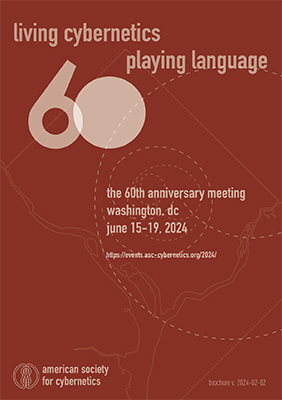living cybernetics
playing language


the 60th anniversary meeting
washington, dc
june 15-19, 2024
a (hi)story
In the 1943 short story, Mimsy Were the Borogoves, a small box with children’s toys originating from a future time and place is sent to Earth [1]. A young boy finds the box and carries it home. While he develops a sufficient understanding of the toys to play with them, to his parents, they remain entirely obscure. It is the boy’s baby sister, still unconditioned by the language of adults, who shows the boy how the toys can form an exit; and thus, she assists both children to escape the world of prediction toward the future. Excluded from this dimension of play, the parents remain behind.
Mimsy Were the Borogoves, written by Catherine Lucille Moore and Henry Kuttner under the pseudonym Lewis Padgett, was included by the cybernetician Gotthard Günther in the first German-language collection of American science fiction in 1952 [2]. The story presents insights that have been critical for cybernetics since its beginning in the transdisciplinary conversations of the Macy Conferences. Language conditions how observers perceive the world in which they live and their possibilities for action. Likewise, perceptions and actions condition the languages that observers develop. When the American Society for Cybernetics (ASC) was founded in 1964, understanding the interdependence of language, thought, and action was considered foundational for cybernetics. Margaret Mead further highlighted the importance of the reconception of language at the first ASC symposium in her now-famous address, later titled ‘Cybernetics of Cybernetics’ by Heinz von Foerster [3]. Advancing ‘cybernetics as a science, a discipline, a meta-discipline, and a practice’ [4], as the ASC’s By-Laws state, cannot be done without taking the tasks of building a language for cybernetics seriously. Equally important is the study of related languaging acts.
situational enactments
Drawing inspiration from the narrative of Mimsy Were the Borogoves, the theme for the 60th-anniversary meeting of the American Society for Cybernetics considers language at play in the connections of pasts, presents, and futures. living cybernetics | playing language further suggests that cybernetic languaging, in all forms and media, shares a logic that is informed by understandings of processes of living as they exist and may exist. Playing is a means to reach out into possible futures, to initiate the not-yet-existent. In homage to past experiments in conversational framings of ASC conferences, the ASC’s 60th-anniversary meeting will engage in situational enactments of cybernetics at a variety of locations in Washington, DC, ranging from an arts center to the zoo.
While we aim for a meeting that engages the values of conversations in the present and in-presence, we will have options for virtual contributions; and two special journal issues as well as a proceedings volume that captures the conversations and carries them into the future is planned as well. Reflecting the conference theme and the anniversary occasion, we have given this proceedings volume the tentative title An Experimental Glossary. If the idea of a glossary links to reductionist ideas of language with fixed definitions, a cybernetician’s task is to turn these constraints into possibilities. Consequently, the adjective experimental carries the glossary into a new realm where language becomes languaging.
enacting conversations
The ASC’s 60th anniversary meeting will take place in Washington, DC, between June 15 and 17, 2024 with two additional workshop days on June 18 and 19. The location and dates will allow for synergies with the ISSS conference, taking place from June 9 to 13 in the same city. June 14 will be dedicated to inter-societal conversations in systems and cybernetics facilitated by the International Federation for Systems Research (IFSR).
We invite you to get involved, initially by indicating your desire to attend the meeting and by proposing interactive presentations, plays, dances, exhibitions, and other forms of conversational framing. You may link your proposal to any of the following three thematic strands: languaging in/for action, archiving archiving, and reimagining technicity. You may consider the entanglement of the three strands in the overarching living cybernetics | playing language theme and their engagements with pasts, presents, and futures. You are further welcome to contextualize and situate your proposal, taking one of the conference locations into account.
1. Padgett, Lewis. 1943. “Mimsy Were the Borogoves.” Astounding Science-Fiction, February, 52–69. https://archive.org/details/sim_astounding-science-fiction_1943-02_30_6/page/52/mode/2up?view=theater.
2. Padgett, Lewis. 1952. “Mimsy Were the Borogoves.” In Überwindung von Raum Und Zeit, edited by Gotthard Günther, 3:186–219. Rauchs Weltraum Bücher. Düsseldorf: Karl Rauch Verlag.
3. Mead, Margaret. 1968. “Cybernetics of Cybernetics.” In Purposive Systems. Proceedings of the First Annual Symposium of the American Society for Cybernetics, edited by Heinz von Foerster, J. D. White, L. J. Peterson, and J. K. Russell, 1–11. New York: Spartan Books.
4. American Society for Cybernetics. [1979] 2009. “ASC By-Laws.” https://asc-cybernetics.org/-by-laws/.
three thematic strands

languaging in/for action
The question of how to conceive languaging in/for action is at the heart of the 60th-anniversary meeting. How to describe what goes beyond description? How to explain cybernetics? What words do we need to speak cybernetics, and how do they need to be spoken? Proposals focusing on ‘languaging in/for action’ may take a word for a walk and, and in the process, create a Cybernetics 101 or a grammar of cybernetics.
archiving archiving
The 60th anniversary provides an opportunity to reflect on the history of cybernetics and the ASC’s past. However, ‘archiving archiving’ alludes to a second-order reflexive turn. Rather than simply storing the voices of the past, we would want to revive them so that their wisdom becomes a productive contribution to creating desirable futures.
Proposals within the ‘archiving archiving’ strand may suggest new structures and methods that link pasts, presents, and futures; they may also reflect on the risks related to attempts of revival.
reimagining technicity
The term technicity suggests that creating things and techniques to assist with the processes of living is an essential and inherent part of being human. How design, agency, and action are conceptualized in relation to technology in the widest sense holds significance for how we understand both time and space and, with it, community, environment, and interaction. Proposals within the ‘reimagining technicity’ strand may reflect on processes and tools that support human agency, diversity, and the creation of sustainable, more-than- human worlds.

call for proposals
While we aim for a conversational meeting and thus do not intend to schedule paper presentations in the classic sense, we are aware that some of you might need a peer-review process and a formal acceptance for your travel funding applications.
We have set up an academic and an alternative submission pathway. Submissions in the academic pathway will go through a double-blind peer-review process. We recommend the academic pathway for everyone who aims to publish an article in one of the special journal issues related to this conference. Submissions in the alternative submissions pathway are subject to a curatorial selection process and will be considered by the organizing committee.
In the academic pathway, you are asked to submit an abstract of roughly 300 words. The proposal will be peer-reviewed. In the alternative pathway, your proposal can be much shorter, but you should nevertheless attempt to describe clearly how you would like to contribute to the 60th Anniversary Meeting, taking the general theme and the related strands into account.
If you have ideas that would fit well into the DC Arts Center as part of a film or performance evening, you should submit them in the alternative pathway. Likewise, ideas for a workshop on June 18 and/or 19 should be submitted in the alternative pathway. We would be particularly interested in proposals that suit the DC Arts Center context. If your work requires support in terms of technology, infrastructure, or consumables, or requires a room that meets a particular set of conditions, please indicate this in your submission. Keep in mind that the ASC 60th Anniversary Meeting is run without external sponsorship. We have only a small budget to support activities.
The organizing committee intends to invite those who submit proposals to participate in the curation of the meeting if they want to.
submissions timeline

Submissions should be made by Monday, 1 April 2024 (extended deadline). Earlier submissions will help us plan!
alternative submission pathway
If you submit a proposal for a contribution to the conference using the alternative pathway, you can expect to hear back from us by 31 March 2024 (April 15 for submissions after March 17).
academic submission pathway
If you submit an abstract in the academic pathway outlining your proposal for a contribution to the conference, you can expect to receive a formal email with comments from the peer reviewers by 10 April 2024 (April 25 for submissions after March 17).
We do not intend to go through a full paper review process before the conference. If you need a full paper acceptance before the conference for travel funding-related reasons, please contact the organizing committee.
planned publications
Two special journal issues and An Experimental Glossary related to the ASC 60th Anniversary theme living cybernetics | playing language are planned. The latter will be flexible in terms of contribution formats. The ASC 60 special journal issues will be published by Constructivist Foundations and Cybernetics & Human Knowing in the spring of 2025.
The deadline for the submission of the full articles will be 1 July 2024. If you plan to submit an article to one of the special journal issues, please read the author guidelines on the journal’s website. You should plan to have a first draft of your paper for the conference dates in June.
The deadline for submissions to the Experimental Glossary will be in August 2024. However, if you are interested in contributing to it, we would want to hear from you at the conference what you think An Experimental Glossary could be and how you would want to contribute to it.
conference registration is open
locations

just North of the Zoo
smithsonian national zoological park
just North of the Friends Meeting
2438 18th Street NW, Washington DC
2111 Decatur Place NW, Washington, DC 20008
The listing order of the locations is from North (top) to South (bottom). The locations are within walking distance from each other. It takes 17 minutes to walk from the Friends Meeting to the DC Arts Center and another 17 minutes to the zoo. Rock Creek Park is the furthest in the North and can be reached from the DC Arts Center within 30 minutes by foot. These Google Maps Directions display the entire route.
schedule overview
saturday, june 15
The ASC’s 60th anniversary meeting will begin at the Friends Meeting of Washington at Decatur Place. The Assembly Room and the adjacent terrace and garden offer opportunities for a variety of session formats, including a conference dinner session in the evening.
sunday, june 16
The day will begin with various sessions in the zoo, weather permitting. The DC Arts Center’s theater will serve as a second venue and as backup in case of rain in the morning. Sessions in the afternoon will take place at the Friends Meeting. The walking distance between the two locations is 17 minutes.
monday, june 17
On Monday, sessions will take place at the Friends Meeting and the DC Arts Center’s theater. Weather permitting, some sessions might be held outdoors in the zoo and Rock Creek Park.
tuesday and wednesday, june 18–19
Tuesday and Wednesday are our workshop days. Workshops will take place at the DC Arts Center, and weather permitting, they could also be held outdoors.
we will be delighted to welcome you as a member of the American Society for Cybernetics
visas and accommodation
If you need an invitation letter for visa-related purposes, please contact: claudia.westermann*at*asc-cybernetics.org
Information about accommodation options will be provided at a later point.
organizing committee
Claudia Westermann, Kate Doyle, Paul Pangaro, Adler Looks Jorge, Mateus van Stralen, Laura Ehmann, Roo Shamim, Ioannis Bardakos, Jude Lombardi, Art Collings, Howard Silverman, Fred Steier.
scientific committee
Allenna Leonard, Anja Pratschke, Ben Sweeting, Candy M. Herr, Claudia Jacques, Claudia Westermann, Fred Steier, Howard Silverman, Ioannis Bardakos, Jocelyn Chapman, José Cabral, Jude Lombardi, Kate Doyle, Larry Richards, Mark Sullivan, Paul Pangaro, Thomas Fischer, Tom Scholte, and others tba.
